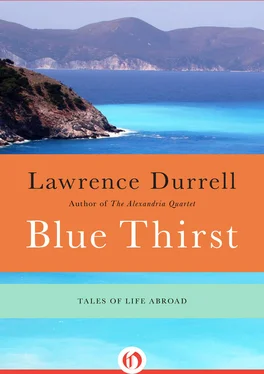And then of course there was the great Tallyrand who’s probably the greatest diplomat of all. You know it’s customary before you’re sent out to your first post to have ten minutes with the Secretary of State. It’s like baptism or circumcision. It’s terrifying for him and for you equally. You don’t know what to say and so he has a tendency to say, “Well, uhum … Durrell, you’re going to … uhum … you’re going to Athens, I think.” “Yessir.” “Well, the ambassador is so and so and so …” What he doesn’t say is that the ambassador is an idiot, that his wife looks disastrous and that he’s socially really hopeless, and that you’ll have to use all your tact to get your job done without offending them. He can’t say that naturally, but he coughs and sputters breathes on you and off you go. Well Tallyrand developed this farewell technique to a fine art and when his young attachés were being posted, he always stopped them as they opened the door and were saying goodbye with the phrase, “ Et surtout par trop de zele.” “And whatever you do, not too much zeal.” Which, of course, was quite right. You see, the only good diplomatic advice is to (a) shut up and (b) don’t do a thing, because fundamentally it’s really good Zen, it’s really good Taoist advice because in the final analysis you can’t do anything. Events are always moving far too fast, the personalities involved are far too unimaginative and silly, and everybody’s been carried away on a tide of absurdity so that really, though it sounds frivolous, but the best thing to do is to sit tight. You are dealing with maniacs and nuts so naturally the situations are nutty.
Of course in my particular department it was one of the things we couldn’t do because I was always posted to crisis spots where sitting tight was just not on because one was always being invaded by Russians or Germans or something like that … But I always remembered the remark about excessive zeal and I always tried to follow it to the best of my ability. And where it was possible to let my colleagues make mistakes, I let them do it. I never won any decorations out of this meritorious business but in fact I didn’t put up, as they say in the service, many “bad blacks.” And my memories of diplomatic life are coloured always by embassies with an enormous fire going in the garden. When the enemy are arriving you burn everything marked “Top Secret” and everything is. I think I’ve been in more retreats than you can possibly imagine.
I’d hardly been taken on in Athens when the Germans nearly arrived. They were 40 miles away, and they had discovered that tanks could come down the railways, they didn’t need the roads. We’d blown up all the roads, of course, but had forgotten the railways. They’d put 50 tanks on the railways and the next thing we knew there were sign posts telling them “Athens 5 miles.” So, naturally, we had to get out very very fast. Well, this always is a marvellous situation because in diplomacy to add to your own importance you mark everything highly confidential and secret because this means that your bureau is sort of upgraded, so consequently you have an immense amount of documentation, most of it from the Encyclopaedia Brittanica and the Guide Bleu, and Mrs Beeton’s which is all marked secret and confidential and it’s essential to burn this because you mustn’t let it fall into German hands. When a British embassy is leaving the first thing you see is a gigantic bonfire with all the attachés, looking like attachés usually look, with kerosene cans dousing manuscripts and a huge plume of smoke going up. It’s a heartening sight. Well, Athens was my starting point in retreating and I’ve been retreating ever since until I ended up last week in Pasadena. My back is against the wall now. I’m at Caltech at the moment defending culture, whatever that is.
But the Athens episode was particularly instructive because we had an extremely bright military attaché who had not respected Tallyrand’s famous advice to his secretaries. He was full of zeal, too full of zeal, and we had far too many documents marked confidential, secret, highly this, highly that and the other, and the garden was full of them. So he put them all in a van. He said, “I have an idea,” he didn’t tell anyone what it was. He took them round to the local crematorium. Now, the Greeks are mad about machinery, but they don’t understand it very well. They had just got a brand new crematorium. The chap, who bought it on a purely commercial basis, was being excommunicated by the archbishop who didn’t believe in burning bodies. But the thing was there and working intermittently. The military attaché took all our scret and confidential documents down there. He put them into one of the crematories and pulled the lever. Unfortunately, something went wrong. The Greek attendant had in some curious way fixed the draught at a wrong angle, and all this half-charred stuff flew out of the main central flue and all over Athens, it was like a snowstorm. I was walking in Athens waiting for some transport so I could run away to the sea, and I saw things coming out of the sky. They were half-charred bits of paper like this piece with dispatches beginning “following from Churchill to Lord Halifax”… And all over the place there were drifts. But as it always happens in grave cases, people never realise when something is given to them, just as they didn’t realise the date of the Normandy landings, when they were given them by a spy in Turkey. So when the Germans came all this paper was swept up. Nobody read a single word. The whole war policy, American, British and everything else was outlined in the secret and confidential information which flew out through the flue and descended like a snowstorm.
That is why too much zeal, you see, ruins the whole shoot. The eager attaché fortunately redeemed himself by becoming a great commando and was much decorated. He’s now a very distinguished war historian. But we had so much trouble with zealots. In the old days of Sir Henry Wooton it could’ve been much different, owing to distance and lack of instant Whitehall interference. Later on, in Egypt, I met Noel Coward who had gotten so sick of this kind of rubber stamp secrecy that he had a huge one made for his manuscript which read “Highly Trivial.” But this is the mere farcical end of diplomacy. It has other more serious functions.
Nowadays what is valuable, and what I did see actually in close action as a perfectly valid operational technique is clever bargaining. Another useful thing you can do is to correctly evaluate personalities in terms of what they might or might not do; and one of the things that the ambassador who’s sensitive and clever, on-the-spot, since he has access to let’s say Archbishop Makarios or Tito or Farouk — (three cases I’m thinking of) — his dispatches are important for the Secretary of State so that he can judge whether to press a little in this way or that way to bring about the desired result. That is something that can’t be done by television or by long distance telephone. So in that sense, and in the commercial and political sense, diplomacy still has its place though it’s a very wearisome occupation. I found it terriby wearying, but I never wasted it in the sense that I was always buoyed up by the feeling that I must make notes the whole time for my novels.
I took a leaf out of the notebook of the man I admire most as a novelist, Stendhal, who was also stuck as a minor consular official all over the globe, but who never relented. And it is very important to know how an ambassador behaves when he’s hysterical. If you’ve helped one on and off with his overcoat for a long time you really do get the feel. In a novelist who’s trying to describe embassy life or what it’s like in Buckingham Palace, if you haven’t been there it’s extremely hard to get away with it. Something hollow in the tone looks through. So in a sense, if I need an embassy I know where to go now. I’ve got three. One ambassador more foolish than the next. One a real genius of foolishness but a marvellous writer who really did the best paper on Tito’s psychology ever. If he hadn’t been a nut he wouldn’t have been able to understand Tito. But it was one of the most delicate and penetrating performances of evaluating whether Tito was going to go back in the fold or whether he was going to stay out on the Balkan wing as an independent and what sort of temperament he had. Really it was a brilliant psychological thing. That was Sir Charles Peake who died recently, and who was one of the vaguest men I ever met. Every time he came to see me in my office he patted a bicycle which was in the hall and said, “Hey, Budgin, how are things down in the cipher room?” In fact, I can assure you that all Evelyn Waugh had to say about diplomats in “Black Mischief” is absolutely dead true. As for Sir Charles, whom I came to love, he could also sit in a chair with his lips working, opposite me at my desk, tearing up paper into smaller and smaller bits, and after three-quarters of an hour say, “Yes. That’s what we’ll do,” and walk out without telling me what the devil it was we must do.
Читать дальше












